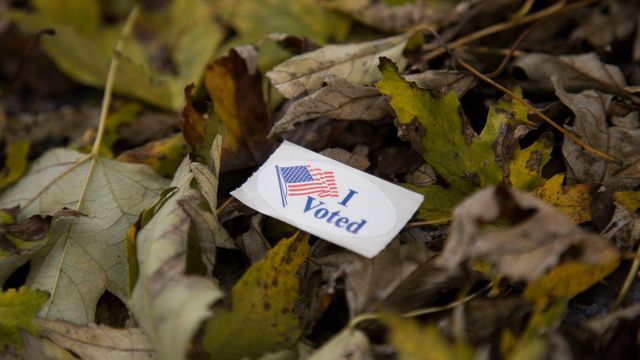As 2024 elections approach, NC officials push to educate voters, bolster trust
During a video briefing last week, North Carolina’s top elections official, Karen Brinson Bell, spent half an hour explaining humdrum, technical details about new rules for the upcoming 2024 elections.
But when a reporter asked about claims of the 2020 presidential race being stolen — and how that might affect turnout during, or trust in, this year’s elections — she became animated, launching into an energetic defense of elections.
“We are seeing strong confidence in North Carolina elections,” Brinson Bell said, noting that 2020 set a new state record for voter turnout with more than 75% of voters casting a ballot. The 2022 midterms likewise had an above-average 51% turnout rate — just the fourth time in the last 40 years that most voters have participated in a midterm election, state data shows.
“When you see voters participating, that’s an indication to us that they still have confidence in the system,” she said. “When you don’t [have confidence], it’s my firm belief that you don’t participate. And yet we’re seeing voters participate on par with what we’ve seen before, if not greater.”
It’s not just voters, Brinson Bell added. Candidates have already turned out in large numbers for the 2024 elections.
Nearly all 170 seats in the state legislature will be contested in either the primary or general election. Ten people are running for governor, to replace term-limited Democratic Gov. Roy Cooper. And dozens are running for seats in the U.S. House of Representatives, including one congressional district in the Triangle area that’s attracted 14 candidates in the GOP primary alone. That proves that politicians don’t actually think elections are rigged, she indicated, even if some might support such claims publicly.
“While there are some naysayers out there — some who are even elected officials already — we saw strong turnout for filing,” Brinson Bell said. “The number of candidates who filed for office? If they don’t believe in the process, if they don’t believe they can be fairly elected, it’s hard to understand why we would see so many people competing on the ballot this year.”
Brinson Bell’s lengthy, passionate response underlies her tricky position heading into 2024: Elections officials across the country have found themselves beset politically on both sides of the aisle, in lawsuits and in the court of public opinion — by politicians, activists and voters who question not just the results of past elections but also whether the 2024 results will be trustworthy or fair.
It’s no different in North Carolina, where some say the state’s elections rules are too overbearing even as others say the rules aren’t strict enough.
Black and Latino voters are suing the state over new rules for voter ID, same-day voter registration and the shapes of the state’s political districts in general, claiming they’ll be discriminated against if the election goes forward without legal intervention.
Meanwhile, polls show a large majority of Republican voters still believe disproven claims about a stolen election spread by then-President Donald Trump in 2020, despite dozens of courts and even former Trump administration officials reaching the same conclusion: that those claims are baseless.
A Gallup poll in 2022 found that 63% of Americans had confidence in the nation’s elections, down from 72% two decades earlier. Behind the numbers, a deep partisan divide is evident: 85% of Democrats expressed faith in the integrity of elections, compared to just 40% of Republicans. Similarly, a CNN poll last year found nearly 70% of Republican voters believe Trump’s false claims that the 2020 election was stolen.
Elections officials such as Brinson Bell are quick to point to North Carolina’s long history of conducting post-election audits, which began years before Trump’s 2020 claims led to Republicans calling for such audits. And this year the state plans to put ads on the airwaves between candidates’ political ads, educating people about voting and some of the new rules.
However, the lingering suspicion of elections among conservative voters inspired North Carolina’s Republican-led legislature to pass a number of new elections laws last year. GOP lawmakers say they’re intended to bolster confidence in election integrity. But those new laws have also now led to those lawsuits from minority voters who say the changes are, in reality, meant simply to disenfranchise them.
Old claims, new laws
In 2020 Trump prematurely declared victory on election night long before many key states, including North Carolina, had finished counting their mail-in ballots. When Trump ended up losing some of those states after the votes were counted, he attacked mail-in voting as fraudulent, despite having voted by mail himself.
The North Carolina legislature, in response, ended the three-day grace period for mail-in ballots to arrive after the election. Starting this year, any mail-in ballots that arrive after polls close on Election Night will be thrown in the trash.
Democrats have called the new law pointless at best, and intentional voter suppression at worst. State law requires that no election results can be made official until 10 days after an election, regardless. So they say getting rid of the three-day grace period does nothing to speed up the results, even as it makes it more likely that legitimate votes won’t be counted.
Republicans say they’re not worried. They trust voters will adjust their habits this year and either not vote by mail at all or get their ballots mailed sooner than in the past. Thousands of people’s ballots would’ve been thrown in the trash in the 2020 and 2022 elections had the new law been in place at the time, state data shows.
A spokesperson for North Carolina Senate leader Phil Berger said that even if there are reports of legitimate ballots being thrown out during the primary election in March, GOP lawmakers have no intent of undoing the law before the general election.
“Last year, the General Assembly made incredible strides in passing additional election integrity measures that bolster election security while providing ample opportunities for eligible voters to participate in the political process,” Berger spokeswoman Lauren Horsch said. “There is no interest in backing down from our election integrity efforts.”
Other recent changes to North Carolina elections laws include a law that further empowers partisan poll observers, which Cleta Mitchell, a Trump 2020 campaign attorney who lives in Moore County, personally pitched in a private meeting with top Republican state senators, WRAL has reported. Those lawmakers have said she didn’t influence their thinking on the matter.
Republicans say loosening the rules for poll observers will help them catch potential instances of voter fraud, but Democrats say it’ll just open the door to voter intimidation of minorities, which has a long and fraught history in North Carolina, including in recent years.
Cooper vetoed the bill that included both the mail-in ballot deadline change and the poll observer rules, saying it “has nothing to do with election security and everything to do with Republicans keeping and gaining power.” Republicans, who hold veto-proof supermajorities in both legislative chambers, overrode his veto on party-line votes.
The NAACP is also suing to stop voter ID, in a case that could possibly resolve in time for the 2024 elections. Like with many other recent changes to election laws, Republicans say it’s needed to combat fraud while Democrats say fraud is already nearly nonexistent and the real intent is to make it harder for minorities or low-income people, who lean Democratic, to cast a ballot.
GOP lawmakers have spent $7.7 million in state funds over the last several years on voter ID education efforts — as well as to make IDs free, at local county elections offices, for anyone who wants one.
“North Carolinians want safe and secure elections,” Horsch said. “Voters made that clear in 2018 when they approved the requirement to show a photo ID to vote.”
That 2018 law was ruled unconstitutional by the North Carolina Supreme Court in 2022 for racial discrimination. However, the court at the time had a Democratic majority. When Republicans took back control of the high court in 2023, the new GOP majority quickly undid that precedent, allowing voter ID to go into use. The court’s opinion was written by Berger’s son, Justice Phil Berger Jr.
North Carolina has been perhaps the most aggressive state in the country in passing laws that, in his view, roll back voting rights — often to the detriment of Black voters, according to Marc Elias, a Democratic attorney who litigates gerrymandering and voting rights cases all across the country. “You can make a very good argument that North Carolina Republicans have been the most anti-democratic legislature in the country for some time now,” he said during an interview on the Defending Democracy podcast, which is published by Democracy Docket, a left-leaning media organization founded by Elias.

In her recent meeting with reporters Brinson Bell didn’t weigh into the many political debates swirling around voter ID, mail-in voting and other recent changes to election laws. She was appointed to her job by Cooper, a Democrat, but has tried to stay publicly nonpartisan since taking office in 2019. A Duplin County native, she spent most of her career running elections in western North Carolina before taking over the top job.
She’s now asking people — no matter which side they’re on — to remember that the actual election workers they’ll be interacting with at the polls this year are just regular members of their community. While there are some full-time elections experts like her making high-level decisions, the actual work of running elections relies on thousands of local volunteers.
In recent years, those workers have faced an onslaught of complaints, records requests, intimidation and aggression from election skeptics, including many peddling disproven election conspiracies — fueling turnover among elections officials and professional staff, and increasing pressure on the community volunteers who do much of the on-the-ground work running polling places during every election.
“It’s the former English teacher who now serves as a poll worker, the former basketball coach who now serves at an early voting site,” Brinson Bell said. “Those are the people who are conducting elections in North Carolina.”















